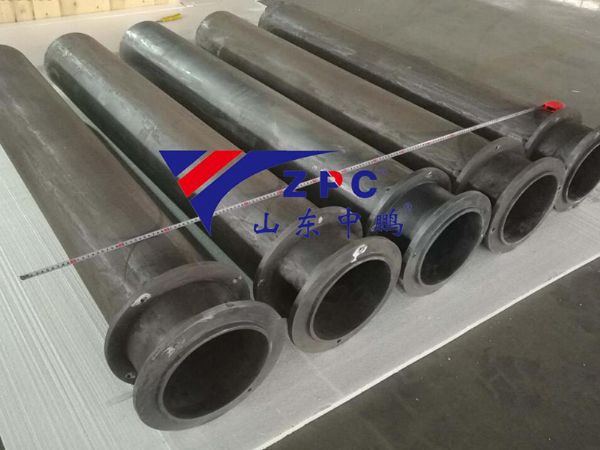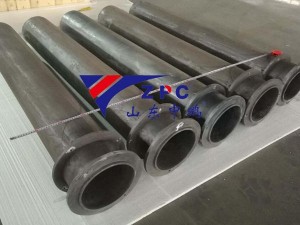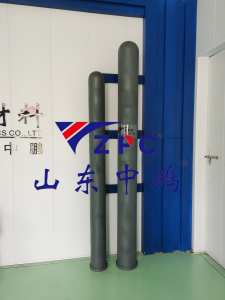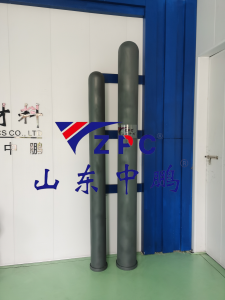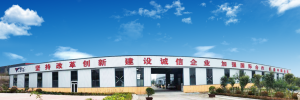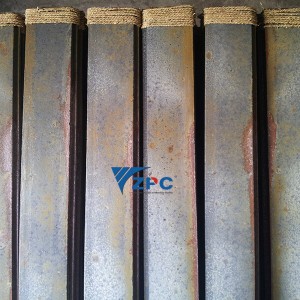Silicon carbide protective tube
In industries where extreme conditions threaten equipment integrity, silicon carbide (SiC) protective tubes emerge as a groundbreaking solution. Unlike conventional shielding materials, SiC tubes combine advanced material science with robust engineering to safeguard critical instruments and processes.It has the following advantages:
1. Unmatched Protection in Hostile Conditions
SiC protective tubes act as a first line of defense in environments where failure is not an option:
(1)Thermal Defense: Withstand sustained temperatures up to 1600°C, shielding sensors, thermocouples, or probes from molten metals, flames, and plasma.
(2)Chemical Immunity: Resist corrosion from acids (e.g. sulfuric, hydrochloric), alkalis, and reactive gases like chlorine or sulfur oxides.
Abrasion Resistance: Protect against erosive particles in fluidized beds, coal gasifiers, or mining operations.
2. Precision and Stability for Critical Measurements
In high-stakes industrial processes, accuracy is paramount. SiC tubes enhance reliability by:
(1)Minimizing Signal Interference: Non-conductive properties prevent electromagnetic disruptions in electronic sensors.
(2)Thermal Stability: Near-zero thermal deformation ensures consistent alignment and measurement accuracy under rapid temperature swings.
(3)Gas-Tight Integrity: Impermeable structure prevents gas infiltration, crucial for vacuum systems or controlled atmospheres.
3. Enabling Next-Generation Technologies SiC protective tubes unlock innovations in emerging fields:
(1)Hydrogen Economy: Serve as durable sheaths for sensors in hydrogen production, storage, and fuel cells, resisting embrittlement and high-pressure H₂ exposure.
(2)Semiconductor Manufacturing: Protect optical and thermal sensors in CVD (Chemical Vapor Deposition) reactors from corrosive precursors like silane or ammonia.
(3)Space Exploration: Shield instrumentation in rocket engines and planetary probes from extreme thermal gradients and cosmic radiation.
4. Cost-Efficiency Through Longevity
While SiC tubes have higher upfront costs, their lifecycle benefits redefine value:
(1)Reduced Downtime: Outlast metal or quartz alternatives by 4–6x in abrasive or acidic settings, minimizing unplanned maintenance.
(2)Zero Coating Requirements: Unlike metals needing protective coatings, SiC’s inherent properties eliminate recurring surface treatment costs.
(3)Reusability: Survive multiple process cycles in applications like metal casting or glass forming without degradation.
5. Customization for Specialized Needs
SiC protective tubes adapt to niche challenges through tailored engineering:
(1)Hybrid Designs: Integrate with metals or ceramics for multi-functional assemblies (e.g. threaded connectors, flanges).
(2)Surface Modifications: Polished interiors for optical applications or textured exteriors to enhance heat dissipation.
(3)Size Flexibility: Manufactured from millimeters (lab-scale reactors) to meters (industrial kilns).
6. Sustainability Alignment
SiC tubes support eco-friendly industrial practices:
(1)Energy Savings: High thermal efficiency reduces furnace fuel consumption by up to 20% compared to metal shields.
(2)Waste Reduction: Long service life cuts material waste from frequent replacements.
(3)Toxicity Mitigation: Eliminate the need for hazardous coatings (e.g., nickel-based alloys) in corrosive environments.
Shandong Zhongpeng Special Ceramics Co., Ltd is one of the largest silicon carbide ceramic new material solutions in China. SiC technical ceramic: Moh’s hardness is 9 (New Moh’s hardness is 13), with excellent resistance to erosion and corrosion, excellent abrasion – resistance and anti-oxidation. SiC product’s service life is 4 to 5 times longer than 92% alumina material. The MOR of RBSiC is 5 to 7 times that of SNBSC, it can be used for more complex shapes. The quotation process is quick, the delivery is as promised and the quality is second to none. We always persist in challenging our goals and give our hearts back to society.
